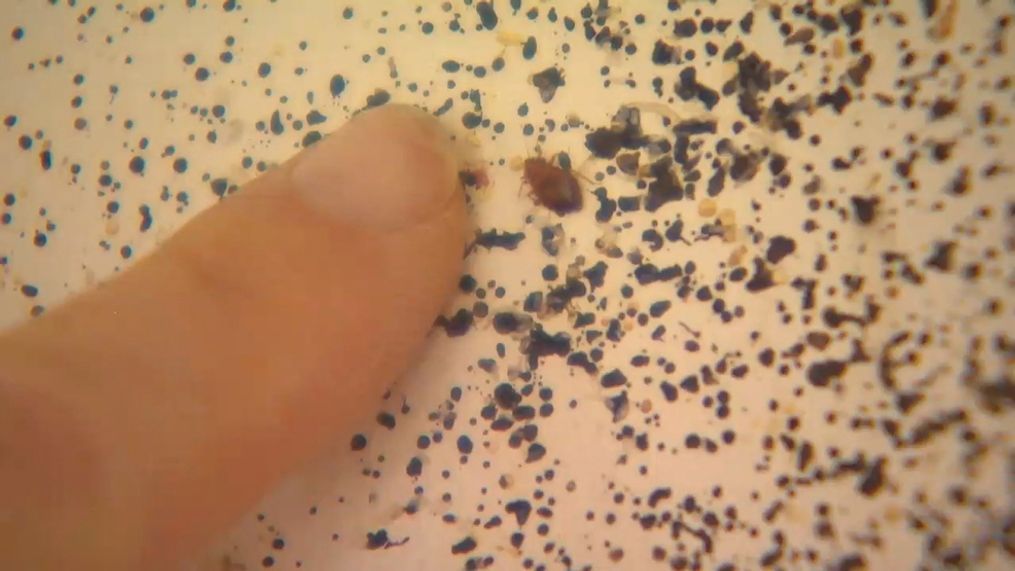Critical things you may not know about avoiding bed bugs when you travel

When you go on your next vacation or getaway, the last thing you want is to bring home an unwanted traveler.
But, insect experts say the chance of that happening goes up every spring and summer, because the peak travel season is also peak bed bug season.
Contrary to what you may think - bed bugs don't fly. And they don't jump. What they do is gravitate to their food source, which is human blood.
"You can come into contact many places when you're out on a trip," explained pest control technician Scot Deland of Williard's Pest Control in Kirkland.
Think of them as travel bugs, parasites that can log thousands of miles - on your dime- in your clothes, handbags and luggage.
Pest control tech Ray Williamson of Paratex in Seattle, says they just crawl into your luggage or cling to your clothing, and hang on.
"And they cling on like their life depends on it, because it does," said Williamson.
Maggie Snyder unknowingly brought bugs home to Seattle from a high-end hotel in New York City, where she stayed several years ago.
"I knew the bed bugs were in my bed," said Snyder. "I came home from my trip and noticed bites all over my legs and on my arms."
Snyder was able to kill the bed bugs and eggs before they could multiply. She's since been bed-bug free.
Russ Hoffman and his husband recently found bed bugs in a long-term stay hotel in Seattle. They'd rented a room for a month after selling their home while waiting to take possession of a new place.
"Every time we go to a hotel or anywhere, we'll pull up the sheets on the corner, and we'll look," Hoffman explained. "And so we saw the telltale stains of the bedbugs. And then we actually found a bed bug!"
Luckily thanks to the bed bug drill, they avoided the bed bug bites.
Here's what they experts say you should do to avoid picking up bed bugs when you travel:
- As soon as you get where you're staying, think twice about what you plan to do with your bag.
- Never put your bags on a bed, upholstered furniture or the carpeted floor.
- Instead, store your baggage in the bathroom. Experts say a shower or the bathtub are the least likely places a bed bug will be.
- Grab the flashlight (that you packed ahead of time) and carefully inspect all the places you'll be sleeping and sitting.
According to a "how to" video demonstration by the University of Minnesota Department of Entomology, bed bugs are known to hide behind framed pictures and around or on furniture. So you should also inspect around nightstands, lamps and even inside the nightstand drawers.
When inspecting the bed, be sure to remove the mattress cover, and carefully inspect the rim around both the mattress and the box spring.
Scot Deland adds that it doesn't hurt to inspect the walls, behind art, mirrors and picture frames.
"The most likley place you're gonna find bed bugs is around the headboard area," said Deland.
If you find anything, take photos like Russ Hoffman did. He says he learned the hotel had recently installed all new mattresses, but did not replace the box springs.
"And I was really relieved when management said, 'Oh, well, we can give you a refund,'" Hoffnan said.
Keep in mind that most hotels and vacation rentals are as interested in preventing, detecting and getting rid of bed bugs as you are. But, they may not always inspect as carefully as they need to in order to find the tiny critters.
Also keep in mind that bed bug eggs are almost microscopic - often the size of a speck of dust. They can be easy to miss.
If you don't find signs of bed bugs, great! Unpack your bags in the bathroom and hang your clothes in the closet.
But inspect drawers very carefully before you use them, just in case.
Some entomologists even say you should inspect the luggage rack around the woven straps, since the critters may have recently migrated from the baggage of a previous guest.
This next step may sound weird, but once you get home, plan on unpacking your bags before you go inside the house.
Pest control experts say ideally, unpack in the garage. If that's not an option, unpack your clothes and fabric items at the front door, or back patio.
Take all your clothing straight to the laundry room and wash everything that's machine washable then dry it on high heat.
Items that are not machine washable should go right into the dryer - since heat is the key.
According to the Washington State Department of Health, the dryer should run on high for at least 20 minutes to kill the bugs and the eggs.
If you have too much for one cycle, place everything in a black plastic bag until you can give it the hot cycle treatment.
Finally, place your luggage in a black garbage bag and tie it up tight. If possible, leave it in the sun for a few hours so the heat can kill any potential stowaways.
Then, store your luggage, black bag and all, away from beds, furniture and carpets. Experts say leave the luggage in the bag for at least 2 weeks.
When it comes to getting rid of bed bugs: you must kill all the bugs and their eggs. Flea bombs don't work on eggs, Outdoor insecticides are not safe indoors. So, your best bet may be to call a reputable pro.
For their recent report on household pests, researchers at Checkbook.org surveyed thousands of Puget Sound area consumers about their experiences with local pest control services.
As a courtesy to KOMO News viewers. Checkbook's full pest control company ratings will be accessible on this website until June 9, 2018.















